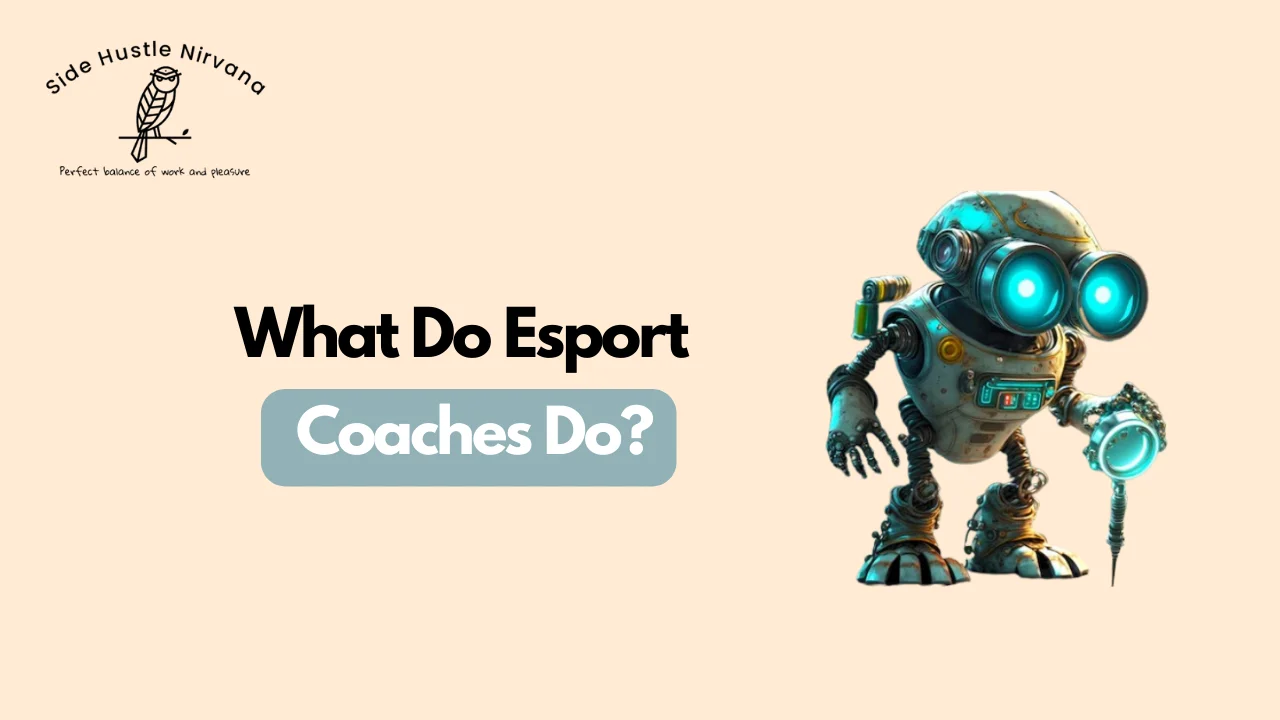What Do Esport Coaches Do?
Esports is no longer just a hobby—it’s a global phenomenon. Competitive gaming has exploded over the last decade, with millions of fans and prize pools rivaling those of traditional sports. But behind the jaw-dropping plays, clutch performances, and strategic wins sits a vital figure often overlooked—the esports coach.
These professionals play a massive role in guiding players and teams to success, blending mentorship with tactical expertise to ensure peak performance. Let’s break it all down and answer the big question—what do esport coaches do?
The Role of an Esports Coach
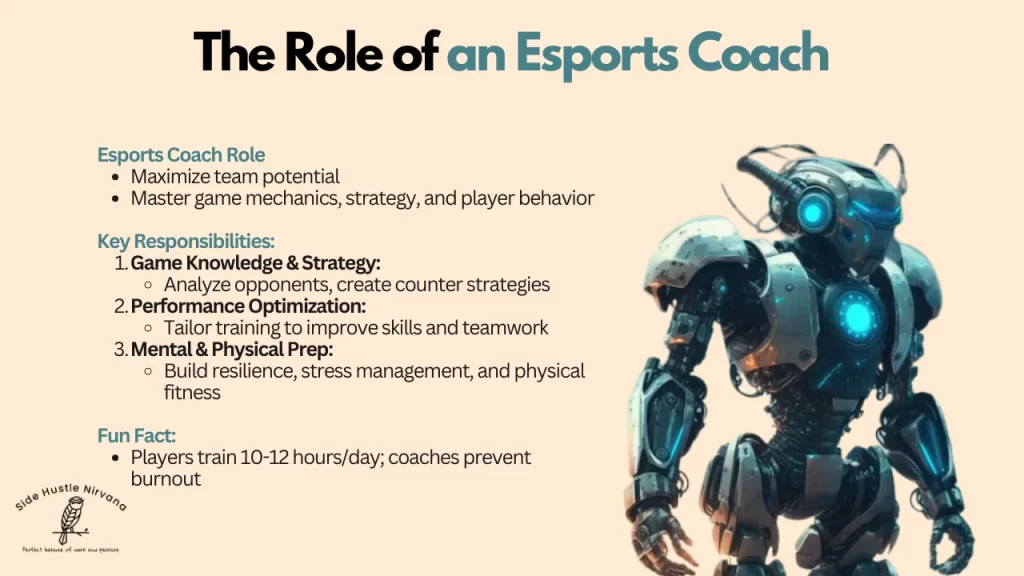
At its core, the job of an esports coach is to maximize a team’s potential, just like a traditional sports coach. But unlike football or basketball, the dynamics of esports demand an intricate understanding of gaming mechanics, player behavior, and rapidly evolving strategies. Whether it’s League of Legends, Counter-Strike, or Valorant, the coach ensures every player performs at their best in a hyper-competitive environment.
Esports Coach Job Description
An esports coach’s job description revolves around three major aspects:
- Game Knowledge and Strategy Development
Coaches need a deep understanding of the game to analyze opponents, create team strategies, and adapt to rapidly changing in-match scenarios. For instance, a League of Legends coach might craft drafts that counter an opposing team’s strengths, while a Counter-Strike 2 coach prepares strategies to control maps. To stay ahead, they use tools like esports analytics platforms to track trends.
- Player Performance Optimization
Coaches analyze their players’ strengths, weaknesses, and tendencies. They then create tailored training regimens to improve gameplay. Esports is not just about fast reflexes—it involves split-second decision-making, precision, and teamwork. A coach may spend hours reviewing VODs (video-on-demand recordings) and hosting practice matches to refine individual and team performance.
- Mental and Physical Preparation
Did you know mental fatigue can significantly impact player performance? This is where the concept of performance coaching in esports comes into play. Mental resilience and sharp focus are key to staying consistent under intense pressure. Coaches often incorporate mental health exercises, stress management techniques, and even physical workouts to keep players in peak condition.
Fun Fact: Studies show that professional esports players train up to 10-12 hours a day—making stress and burnout common challenges. Coaches are there to safeguard their players.
If you want an even deeper look at what performance coaches specifically do, check resources like this overview of performance coaching in esports.
What Do Performance Coaches Do in Esports?
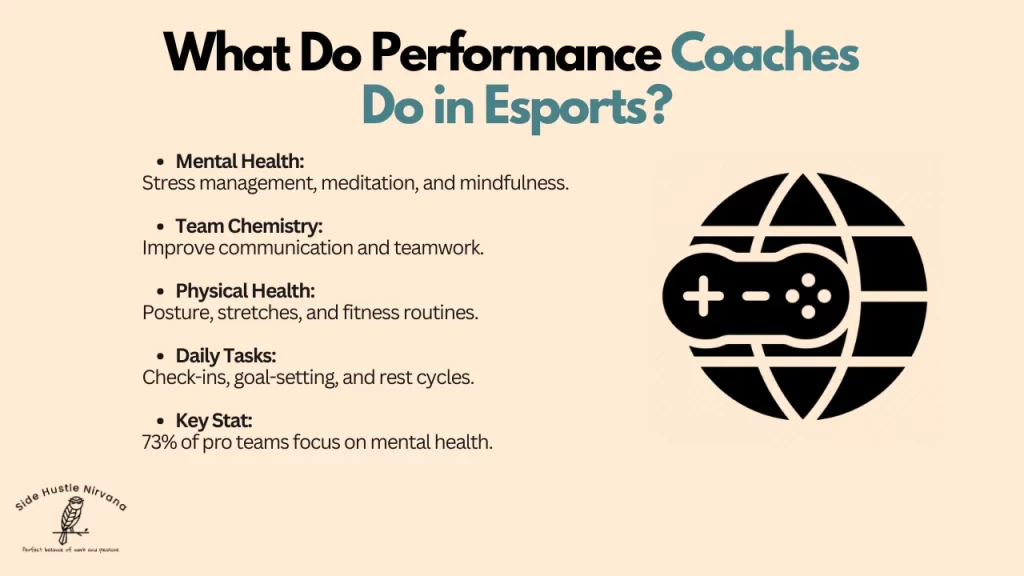
While every esports coach is involved in building skills and strategies, performance coaches focus on holistic growth—they tackle the mental, physical, and team dynamics that create well-rounded players. These coaches are common in high-pressure titles like Valorant, Counter-Strike, and League of Legends.
If you’re considering a career in coaching, our guide on how to become a game coach in 2025 provides a roadmap to success in this exciting field.
Core Responsibilities
- Mental Health Management
Burnout is a real issue in esports. Performance coaches help gamers learn coping strategies to stay calm under pressure. For instance, meditation and mindfulness exercises are becoming staples for many esports professionals.
- Building Team Chemistry
Gaming might seem like a solo experience, but success in esports often depends on teamwork. Performance coaches guide players on effective communication and resolving conflicts. With effective team synergy, a coach ensures their squad acts as one cohesive unit.
- Physical Well-Being
Surprising, right? It turns out that gaming at a high level requires physical stability. Proper posture, wrist stretches, and even cardio training help players avoid injuries like carpal tunnel syndrome. Performance coaches bring fitness routines that enhance concentration and prevent gaming fatigue.
Check out examples of how performance coaching is reshaping esports strategies on platforms like The Esports Observer.
Case Study
During CS2’s competitive circuit in 2024, a leading esports team credited their performance coach for helping them bounce back from a losing streak. By re-building confidence and introducing custom focus drills, the team improved their coordination and went on to win!
Key Stat: Mental skills like focus and composure are now a top hiring priority for coaches, with surveys showing 73% of pro teams are increasing support for mental health.
If you’re wondering, “What do performance coaches do in esports on a daily basis?”—everything from strategic player check-ins, discussing goals, and updating resilience training, to overseeing proper rest cycles.
Recommended Tool
Explore this mental toughness guide for online tips aimed at aspiring esports coaches looking to hone players’ performance holistically.
How Esports Coaches Shape Teams
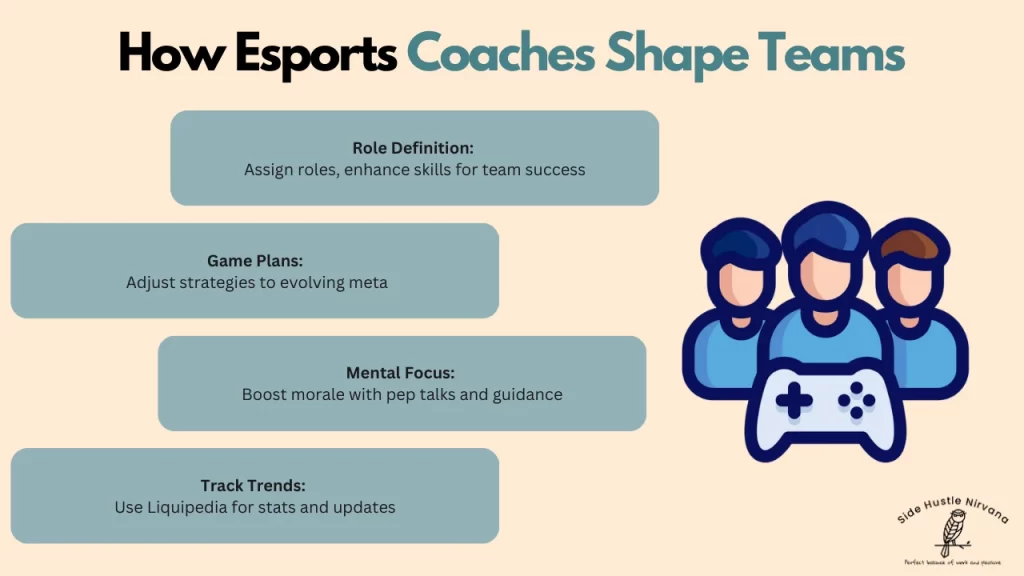
Every gamer knows a bad team dynamic can result in catastrophic losses. Coaches give structure to the chaos, ensuring every game plan works cohesively. Here’s how they shape teams:
Coaches play a pivotal role in esports teams, so understanding how to start an esports team can help you better lead and mentor players.
Role Definition
Each player brings unique skills. A coach assigns and polishes roles to ensure every move serves the team’s overall gameplay. Think of League of Legends coaching, where support players must master map awareness to give their ADCs (Attack Damage Carries) an edge.
Reviewing and Updating Game Plans
The esports meta (most effective tactics available) evolves quickly. Coaches must identify trends and adjust accordingly. For example, Fortnite strategy shifts every time mechanics like Zero Build or new weapons are added. Coaches who stay ahead of meta changes dominate tournaments.
Want to stay updated on how teams evolve within up-to-date esports tournaments? The platform Liquipedia is ideal for tracking stats and trends across the competitive circuit.
Handling the Team’s Mental Landscape
Great plays aren’t just the result of skill—they’re the product of discipline and focus. Coaches use pep talks, in-match guidance, and tactical pauses to stabilize team morale.
Skills Needed to Be an Esports Coach
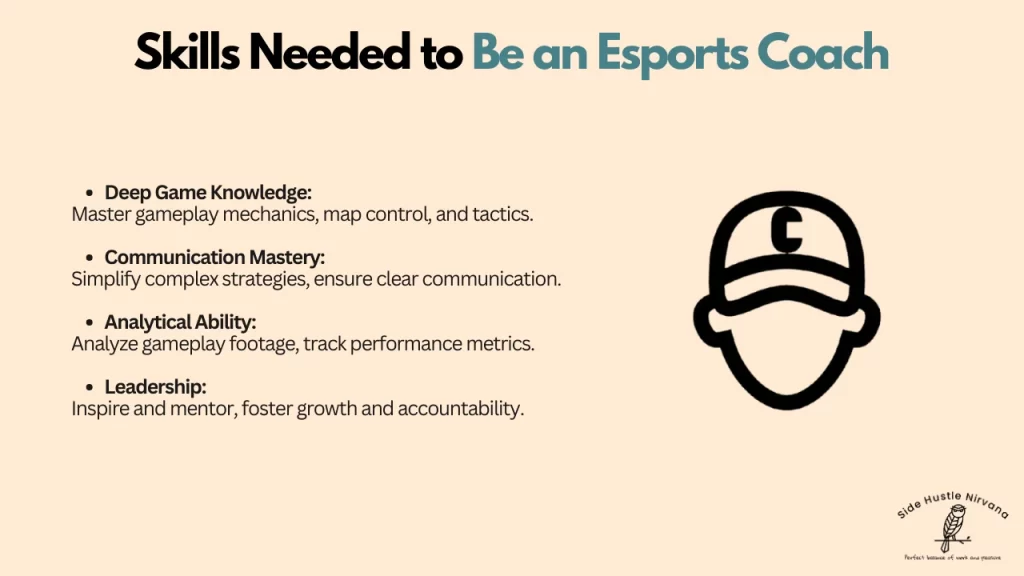
If you’re aspiring to be an esports coach yourself, here are key skills every coach must possess:
- Deep Game Knowledge
Your expertise should surpass even the seasoned pros. Whether it’s map control in Rainbow Six or aim precision in Valorant, you must break down gameplay mechanics to boost team outcomes.
For detailed stats on in-demand game mechanics, check ProGuides—a hub for both players and up-and-coming esports coaches.
- Communication Mastery
An esports coach must know how to explain even the most complex processes in simple terms. Miscommunication mid-game can cost championships. - Analytical Ability
What separates a great coach from a good player? Insights. Coaches dissect gameplay footage (both wins and losses) to identify areas for growth. Tools like Tracker.gg help monitor detailed performance metrics. - Leadership
You’re not just a strategist—you’re a mentor. Coaches who inspire their team through support and accountability build environments where gamers thrive.
The Future of Esports Coaching
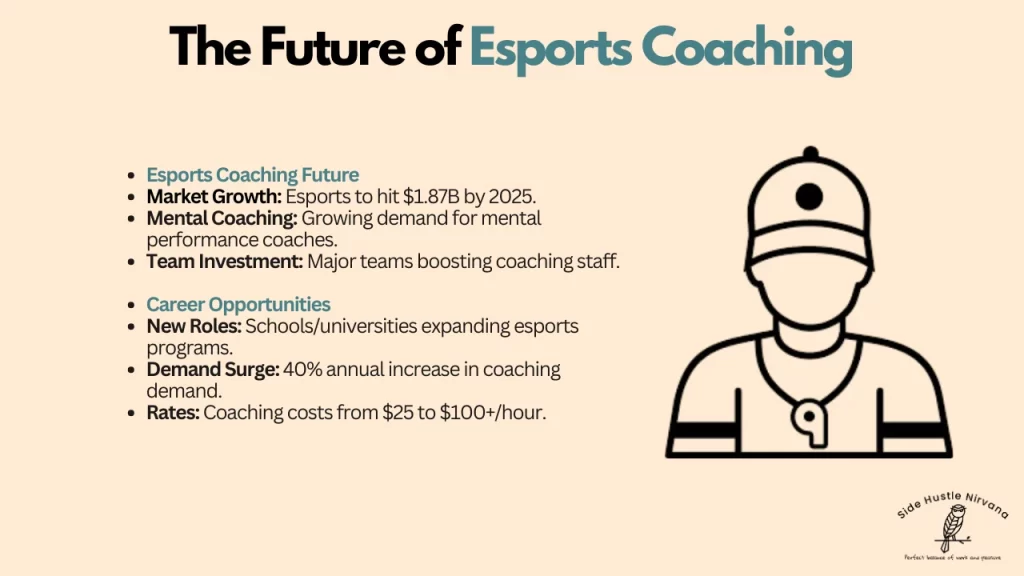
The demand for esports coaches is skyrocketing, thanks to the industry’s rapid growth. The global esports market is predicted to reach $1.87 billion by 2025, according to Statista.
Furthermore, specialized coaching niches, like mental performance coaching, are becoming essential as prize pools grow larger and competition intensifies.
Major esports teams are investing more resources into their coaching staff.
Platforms like OpTic Gaming highlight how a combination of traditional analytical coaches and performance coaches ensures long-term success.
Rising Career Opportunities
The role of an esports coach is no longer limited to professional teams. Increasingly, schools and universities are introducing esports programs. This shift creates new roles for mid-tier and youth coaches. For instance, companies like Vanta Leagues are pioneering structured coaching for younger players.
Hot Stat: Esports coaching platforms like Gamer Sensei report a 40% annual increase in client demand, with coaching pricing packages ranging from $25/hour to over $100/hour for elite coaches.
Final Thoughts
If you’ve been wondering, “What do esport coaches do?”—the answer lies somewhere between mentor, strategist, and behind-the-scenes MVP. From sharpening a team’s tactics to building mental resilience, these coaches ensure every performance hits its peak.
Whether you’re considering hiring one or dreaming of becoming one, the opportunities in esports coaching continue to grow alongside the industry itself. And with trends pointing toward an even greater emphasis on mental performance and team cohesion, the future for coaches is brighter than ever.
Want to jumpstart your coaching career? Stay adaptable, stay curious, and—of course—stay gaming.

